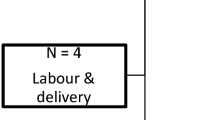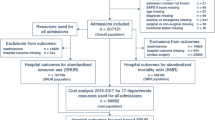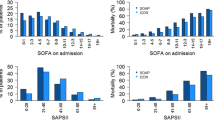Summary
Two years ago, the working group „Quality Assurance” of the German Interdisciplinary Society of Intensive Care (DIVI) defined a core data set for data collection and benchmarking in intensive care and established a central register. Data collection started in June 2000. Until February 2001, 23 intensive care units (ICU) contributed to this register. The core data contain information about the patient‘s situation on admission (demographic data, diagnosis, SAPS II score), daily assessment of organ function (SOFA score) and therapeutic activities (TISS-28), and outcome. In this first phase of data collection 3707 patients (mean age 62.5 years; male patients 60.7%) with a total of 17653 days on ICU were documented. The rate of elective postoperative admissions was 52.2%, 14.6% were admitted after emergency surgery, and 33.2% had no previous operation. The mean duration of stay on ICU was 4.0 days (range 1–89), while 37.6% of patients were discharged within 24 hours. 338 patients (9.1%) had multiple organ failure according to the SOFA score. Presence of organ failure varied between 2.1% (liver) and 12.7% (cardiovascular) of all days. 218 patients (5.9%) died on ICU, while the predicted hospital mortality based on the SAPS II prognosis (mean score value 26.8) was 12.7%. Each participating unit received a blinded quality report with comparative presentation of structural items, patient characteristics, process and results of intensive care, subgroup analyses, the incidence of selected quality indicators, and graphical comparisons. The individual data of each unit are compared with the total values of all participants. Furthermore, identification of individual cases, graphical comparison of units, and subgroup analyses should encourage an internal process of quality improvement, known as benchmarking. Future analysis of changes over time will enhance the evaluation of improvements in local structures and process of care.
Zusammenfassung
Als Instrument zur externen Qualitätssicherung hat die interdisziplinäre Arbeitsgruppe Qualitätssicherung der DIVI einen Kerndatensatz definiert und mit diesem begonnen, ein nationales Register der Intensivmedizin zu etablieren. Von Juni 2000 bis Februar 2001 haben sich 23 Abteilungen an diesem Register beteiligt. Der Datensatz umfasst Aufnahmestatus (Basisdaten, Diagnose, SAPS II), tägliche Verlaufsdokumentation (Organfunktion, SOFA und TISS-28 Score) und Outcome der Patienten. In der ersten Auswertung wird über 3707 Patienten (Altersmittel 62,5 Jahre; 60,7% männlich) mit insgesamt 17653 Behandlungstagen berichtet. 52,2% der Patienten kamen elektiv postoperativ auf die Intensivstation, 14,6% nach Notfalloperationen und 33,2% ohne vorherige Operation. Die mittlere Liegedauer betrug 4,0 Tage (Bereich 1–89); 37,6% der Patienten waren bereits nach 24 Stunden wieder verlegt/entlassen. Gemäß SOFA-Score hatten 338 Patienten (9,1%) ein Multiorganversagen. Die Prävalenz für einzelne Organe, bezogen auf alle Tage, lag zwischen 2,1% (Leber) und 12,7% (Herz/Kreislauf). 218 Patienten sind auf der Intensivstation verstorben (5,9%). Die auf dem SAPS-II-Score (Mittelwert: 26,8) basierende Prognose der Krankenhaus-Letalität betrug 12,7%. Der anonymisierte Qualitätsbericht enthält Angaben zu Strukturdaten der Abteilung, Patientencharakteristik, Verlauf und Ergebnis der Intensivtherapie, ausgewählte Qualitätsindikatoren, graphische Klinikvergleiche sowie Subgruppenanalysen. Jede Klinik enthält neben den eigenen Daten den jeweiligen Gesamtwert aller Kliniken. Einzelfalldarstellungen, graphische Klinikvergleiche und Subgruppenanalysen sollen den internen Prozess der Qualitätssicherung durch „Benchmarking” fördern. Künftige Vergleiche im Zeitverlauf können zur Evaluation spezifischer Maßnahmen oder Strukturveränderungen beitragen.
Similar content being viewed by others
Author information
Authors and Affiliations
Consortia
Additional information
Eingegangen: 17. Januar 2002 Akzeptiert: 11. Februar 2002
Rights and permissions
About this article
Cite this article
Lefering, R., für die Interdisziplinäre Arbeitsgruppe „Qualitätssicherung¶in der Intensivmedizin”¶der Deutschen Interdisziplinären Vereinigung für Intensivmedizin (DIVI). Erste Ergebnisse des nationalen Registers zum externen Qualitätsvergleich der Intensivmedizin. Intensivmed 39, 334–340 (2002). https://doi.org/10.1007/s00390-002-0316-5
Issue Date:
DOI: https://doi.org/10.1007/s00390-002-0316-5




